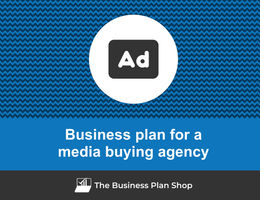How to create a financial forecast for a media buying agency?
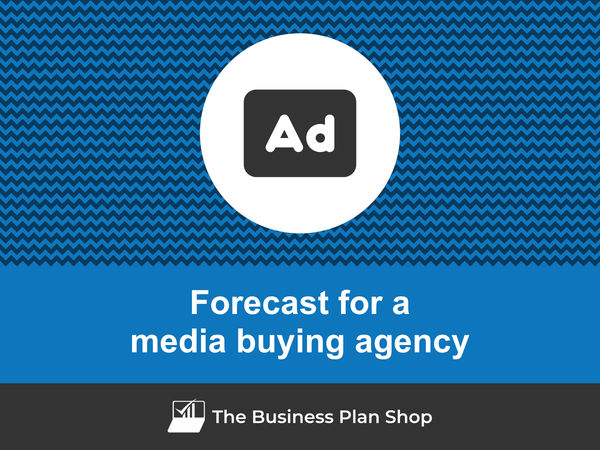
If you are serious about keeping visibility on your future cash flows, then you need to build and maintain a financial forecast for your media buying agency.
Putting together a media buying agency financial forecast may sound complex, but don’t worry, with the right tool, it’s easier than it looks, and The Business Plan Shop is here to guide you.
In this practical guide, we'll cover everything you need to know about building financial projections for your media buying agency.
We will start by looking at why they are key, what information is needed, what a forecast looks like once completed, and what solutions you can use to create yours.
Let's dive in!
Why create and maintain a financial forecast for a media buying agency?
Creating and maintaining an up-to-date financial forecast is the only way to steer the development of your media buying agency and ensure that it can be financially viable in the years to come.
A financial plan for a media buying agency enables you to look at your business in detail - from income to operating costs and investments - to evaluate its expected profitability and future cash flows.
This gives you the visibility needed to plan future investments and expansion with confidence.
And, when your trading environment gets tougher, having an up to date media buying agency forecast enables you to detect potential upcoming financing shortfalls in advance, enabling you to make adjustments or secure financing before you run out of cash.
It’s also important to remember that your media buying agency's financial forecast will be essential when looking for financing. You can be 100% certain that banks and investors will ask to see your numbers, so make sure they’re set out accurately and attractively.
Need a convincing business plan?
The Business Plan Shop makes it easy to create a financial forecast to assess the potential profitability of your projects, and write a business plan that’ll wow investors.

What information is used as input to build a media buying agency financial forecast?
A media buying agency's financial forecast is only as good as the inputs used to build it.
If you are creating (or updating) the forecast of an existing media buying agency, then you mostly need your accounting information, key historical operating non-financial data, and your team’s input on what to expect for the coming years.
If you are building financial projections for a media buying agency startup, you will need to have done your research and have a clear picture of your competitive environment and go-to-market strategy so that you can forecast sales accurately.
For a new venture, you will also need a precise list of the resources needed to keep the media buying agency running on a day-to-day basis and a list of the equipment and expenditures required to start the business (more on that later).
Let's now take a closer look at the elements that make up your media buying agency's financial forecast.
The sales forecast for a media buying agency
From experience, it is usually best to start creating your media buying agency financial forecast by your sales forecast.
To create an accurate sales forecast for your media buying agency, you will have to rely on the data collected in your market research, or if you're running an existing media buying agency, the historical data of the business, to estimate two key variables:
- The average price
- The number of monthly transactions
To get there, you will need to consider the following factors:
- Economic conditions: Changes in the overall economy, such as a recession or economic boom, can greatly impact the average price and number of transactions for your media buying agency. During a recession, businesses may have tighter budgets and be less likely to spend on advertising, resulting in a decrease in your average price. On the other hand, during an economic boom, businesses may have more disposable income and be more willing to invest in advertising, resulting in an increase in your average price and number of transactions.
- Changes in technology: As technology continues to advance, it can greatly impact the way businesses advertise and the platforms they use. For example, the rise of social media has led to a decrease in traditional advertising methods, such as print and television. This shift can affect your average price as businesses may be more willing to invest in digital advertising, resulting in a decrease in your average price for traditional media buying services.
- Industry trends: Keeping up with industry trends is crucial for a media buying agency. Changes in consumer behavior, shifting demographics, and emerging platforms can all greatly impact the average price and number of transactions for your agency. For example, if there is a trend towards influencer marketing, businesses may be more likely to invest in this type of advertising, resulting in a decrease in your average price for traditional media buying services.
- Competition: The level of competition in the media buying industry can also affect your average price and number of transactions. If there are many other agencies offering similar services, businesses may have more bargaining power and be able to negotiate lower prices. On the other hand, if there are only a few agencies in the market, you may be able to charge higher prices for your services.
- Regulations: Changes in regulations, such as privacy laws or advertising restrictions, can also impact the average price and number of transactions for your agency. For example, if new privacy laws are implemented, it may limit the types of data you can collect for targeting and impact the effectiveness of your advertising services, resulting in a decrease in your average price.
Once you have an idea of what your future sales will look like, it will be time to work on your overhead budget. Let’s see what this entails.
Need a convincing business plan?
The Business Plan Shop makes it easy to create a financial forecast to assess the potential profitability of your projects, and write a business plan that’ll wow investors.

The operating expenses for a media buying agency
Once you know what level of sales you can expect, you can start budgeting the expenses required to operate your media buying agency on a daily basis.
Expenses normally vary based on how much revenue you anticipate (which is why, from experience, it is always better to start your forecast with the topline projection), and where your business is based.
Operating expenses for a media buying agency will include some of the following items:
- Staff costs: This includes salaries, benefits, and payroll taxes for all employees working at the media buying agency. This can also include freelancers or contractors that are hired for specific projects.
- Accountancy fees: As a media buying agency, you will need to keep track of your finances and taxes. This may require hiring an accountant or using accounting software, which will incur fees.
- Insurance costs: To protect your business, you will need to purchase insurance policies such as general liability, professional liability, and workers' compensation insurance.
- Software licenses: Media buying agencies rely heavily on software for tasks such as ad buying, data analysis, and project management. These software licenses can be a significant expense for the agency.
- Banking fees: As a business, you will have various banking needs such as maintaining a business account, processing payments, and making transfers. These transactions can incur fees from your bank.
- Office rent: Your media buying agency will need a physical office space to operate, which will incur rent expenses. This can also include utilities such as electricity, water, and internet.
- Marketing and advertising costs: To attract clients and promote your services, you will need to invest in marketing and advertising efforts. This can include expenses for social media ads, print ads, and event sponsorships.
- Travel expenses: As a media buying agency, you may need to travel for client meetings, conferences, or industry events. This can include expenses for flights, accommodations, and meals.
- Training and development: In a fast-paced industry like media buying, it is essential to keep your skills and knowledge up to date. This may require investing in training and development programs for your employees.
- Supplies and equipment: Your media buying agency will need basic office supplies such as computers, printers, and stationery. You may also need to purchase specialized equipment for tasks like graphic design or video editing.
- Legal fees: As a business, you may need legal services for tasks such as drafting contracts, trademark registration, or handling any legal issues that may arise.
- Professional memberships and subscriptions: To stay informed and connected in the media buying industry, you may need to invest in memberships to professional organizations or subscribe to industry publications.
- Rentals and leases: Your media buying agency may need to rent or lease equipment, such as cameras or lighting, for specific projects or events.
- Office maintenance: Keeping your office space clean and functional is important for creating a professional and productive work environment. This may include expenses for cleaning services, repairs, and maintenance.
- Client entertainment: As a media buying agency, you may need to entertain clients for meetings or events. This can include expenses for meals, tickets to shows or events, and other forms of hospitality.
This list will need to be tailored to the specificities of your media buying agency, but should offer a good starting point for your budget.
What investments are needed to start or grow a media buying agency?
Your media buying agency financial forecast will also need to include the capital expenditures (aka investments in plain English) and initial working capital items required for the creation or development of your business.
For a media buying agency, these could include:
- Office Space: You will need a physical space to run your media buying agency, including desks, chairs, and other office furniture, as well as necessary technology infrastructure such as computers, printers, and phones.
- Software and Tools: As a media buying agency, you will need to invest in software and tools that will help you research, plan, and execute media buying strategies. This can include media planning software, ad management tools, and analytics platforms.
- Vehicles: If your agency will be involved in outdoor advertising, you may need to purchase vehicles to transport and install advertising materials, such as billboards or posters.
- Equipment: Depending on the types of media you will be buying, you may need to purchase equipment such as cameras, lighting, and sound equipment for video or audio advertising, or printing equipment for print advertising.
- Office Renovations: If you plan to renovate or customize your office space, this can also be considered a capital expenditure. This can include things like painting, flooring, or adding new fixtures to the space.
Again, this list will need to be adjusted according to the size and ambitions of your media buying agency.
Need a convincing business plan?
The Business Plan Shop makes it easy to create a financial forecast to assess the potential profitability of your projects, and write a business plan that’ll wow investors.

The financing plan of your media buying agency
The next step in the creation of your financial forecast for your media buying agency is to think about how you might finance your business.
You will have to assess how much capital will come from shareholders (equity) and how much can be secured through banks.
Bank loans will have to be modelled so that you can separate the interest expenses from the repayments of principal, and include all this data in your forecast.
Issuing share capital and obtaining a bank loan are two of the most common ways that entrepreneurs finance their businesses.
What tables compose the financial plan for a media buying agency?
Now let's have a look at the main output tables of your media buying agency's financial forecast.
The projected profit & loss statement
The projected profit & loss shows how profitable your media buying agency is likely to be in the years to come.
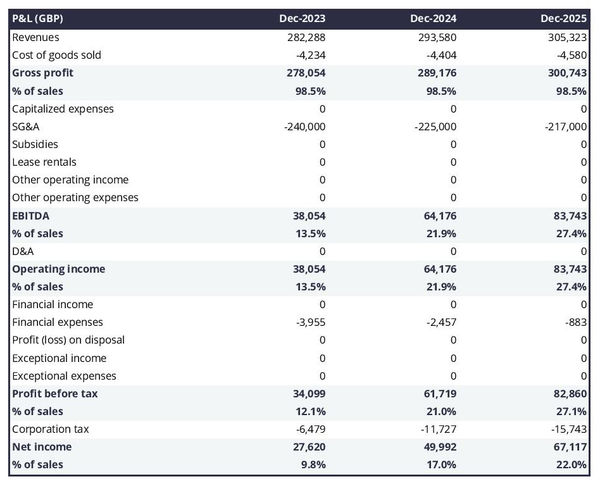
For your media buying agency to be financially viable, your projected P&L should ideally show:
- Sales growing above inflation (the higher the better)
- Profit margins which are stable or expanding (the higher the better)
- A net profit at the end of each financial year (the higher the better)
This is for established media buying agencies, there is some leniency for startups which will have numbers that will look a bit different than existing businesses.
The projected balance sheet
The projected balance sheet gives an overview of your media buying agency's financial structure at the end of the financial year.
It is composed of three categories of items: assets, liabilities and equity:
- Assets: are what the business possesses and uses to produce cash flows. It includes resources such as cash, buildings, equipment, and accounts receivable (money owed by clients).
- Liabilities: are the debts of your media buying agency. They include accounts payable (money owed to suppliers), taxes due and bank loans.
- Equity: is the combination of what has been invested by the business owners and the cumulative profits to date (which are called retained earnings). Equity is a proxy for the value of the owner's stake in the business.
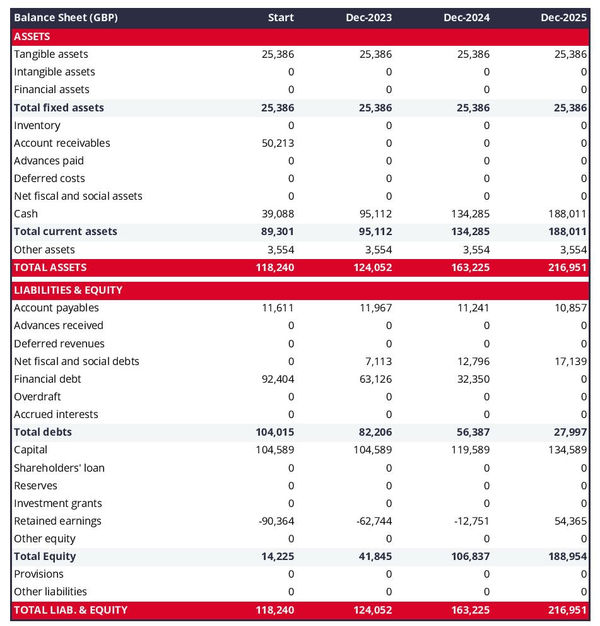
The projected cash flow statement
A projected cash flow statement for a media buying agency is used to show how much cash the business is generating or consuming.
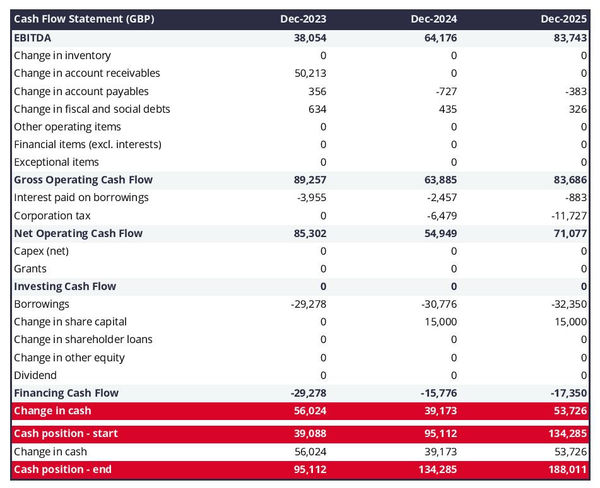
The cash flow forecast is usually organised by nature to show three key metrics:
- The operating cash flow: do the core business activities generate or consume cash?
- The investing cash flow: how much is the business investing in long-term assets (this is usually compared to the level of fixed assets on the balance sheet to assess whether the business is regularly maintaining and renewing its equipment)?
- The financing cash flow: is the business raising new financing or repaying financiers (debt repayment, dividends)?
Cash is king and keeping an eye on future cash flows is imperative for running a successful business. Therefore, you should pay close attention to your media buying agency's cash flow forecast.
If you are trying to secure financing, note that it is customary to provide both yearly and monthly cash flow forecasts in a financial plan - so that the reader can analyze seasonal variation and ensure the media buying agency is appropriately capitalised.
Need a convincing business plan?
The Business Plan Shop makes it easy to create a financial forecast to assess the potential profitability of your projects, and write a business plan that’ll wow investors.

Which tool should you use to create your media buying agency's financial forecast?
Creating your media buying agency's financial forecast may sound fairly daunting, but the good news is that there are several ways to go about it.
Using online financial forecasting software to build your media buying agency's projections
The modern and easiest way is to use an online financial forecasting tool such as the one we offer at The Business Plan Shop.
There are several advantages to using specialised software:
- You can easily create your financial forecast by letting the software take care of the financial calculations for you without errors
- You have access to complete financial forecast templates
- You get a complete financial forecast ready to be sent to your bank or investors
- You can easily track your actual financial performance against your financial forecast, and recalibrate your forecast as the year goes by
- You can create scenarios to stress test your forecast's main assumptions
- You can easily update your forecast as time goes by to maintain visibility on future cash flows
- You have a friendly support team on standby to assist you when you are stuck
- It’s cost-efficient and much cheaper than using an accountant or consultant (see below)
If you are interested in this type of solution, you can try our projection software for free by signing up here.
Hiring a financial consultant or chartered accountant
Hiring a consultant or chartered accountant is also an efficient way to get a professional media buying agency financial projection.
As you can imagine, this solution is much more expensive than using software. From experience, the creation of a simple financial forecast over three years (including a balance sheet, income statement, and cash flow statement) is likely to start around £700 or $1,000 excluding taxes.
The indicative estimate above, is for a small business, and a forecast done as a one-off. Using a financial consultant or accountant to track your actuals vs. forecast and to keep your financial forecast up to date on a monthly or quarterly basis will naturally cost a lot more.
If you choose this solution, make sure your service provider has first-hand experience in your industry, so that they may challenge your assumptions and offer insights (as opposed to just taking your figures at face value to create the forecast’s financial statements).
Why not use a spreadsheet such as Excel or Google Sheets to build your media buying agency's financial forecast?
Creating an accurate and error-free media buying agency financial forecast on Excel (or any spreadsheet) is very technical and requires both a strong grasp of accounting principles and solid skills in financial modelling.
Most entrepreneurs lack the expertise required to create an accurate financial forecast using spreadsheet software like Excel or Google Sheets. As a result, it is unlikely anyone will trust your numbers.
The second reason is that it is inefficient. Building forecasts on spreadsheets was the only option in the 1990s and early 2000s, nowadays technology has advanced and software can do it much faster and much more accurately.
This is why professional forecasters all use software. With the rise of AI, software is also becoming smarter at helping us detect mistakes in our forecasts and helping us analyse the numbers to make better decisions.
Finally, like everything with spreadsheets, tracking actuals vs. forecasts and updating your forecast as the year progresses is manual, tedious, error-prone, and time-consuming. Whereas financial forecasting software like The Business Plan Shop is built for this.
Need a convincing business plan?
The Business Plan Shop makes it easy to create a financial forecast to assess the potential profitability of your projects, and write a business plan that’ll wow investors.

Use our financial forecast templates for inspiration
The Business Plan Shop has dozens of financial forecast examples available.
Our templates contain both a financial forecast and a written business plan which presents, in detail, the company, the team, the strategy, and the medium-term objectives.
Our templates are a great source of inspiration, whether you just want to see what a complete business plan looks like, or are looking for concrete examples of how you should model financial elements in your own forecast.
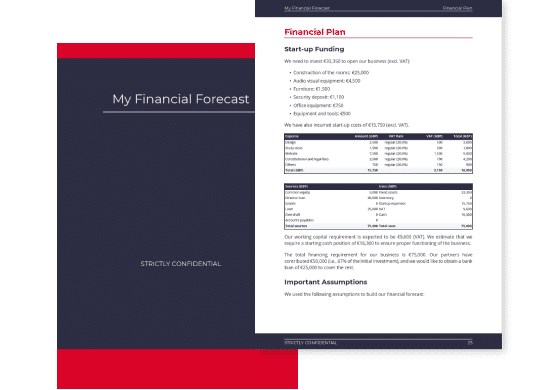
Takeaways
- A financial projection shows expected growth, profitability, and cash generation for your business over the next three to five years.
- Tracking actuals vs. forecast and keeping your financial forecast up-to-date is the only way to maintain visibility on future cash flows.
- Using financial forecasting software makes it easy to create and maintain up-to-date projections for your media buying agency.
You have reached the end of our guide. We hope you now have a better understanding of how to create a financial forecast for a media buying agency. Don't hesitate to contact our team if you have any questions or want to share your experience building forecasts!
Need a convincing business plan?
The Business Plan Shop makes it easy to create a financial forecast to assess the potential profitability of your projects, and write a business plan that’ll wow investors.

Also on The Business Plan Shop
- Example of financial projections
- How to create a sales forecast for a business?
- Financial forecast template for a business idea
Know someone who runs or wants to start a media buying agency? Share our financial projection guide with them!


